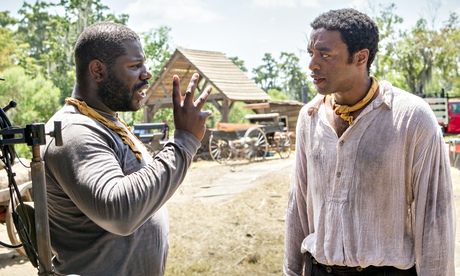
The bookies, at least, are of one mind: Sunday's Oscars victor will be either Gravity or 12 Years a Slave. The space spectacular must surely rank as the greatest-ever achievement of British film craftsmanship; the Louisiana-set drama doesn't even qualify as a UK film. Nonetheless, Britain's cinema chauvinists aren't all rooting for Gravity. There is something about its rival that inspires yet fiercer patriotism.
Of course, unlike Gravity, Slave features British stars. But that doesn't fully explain its hold on British hearts. Something else is involved: after decades of guilty silence from Hollywood, many believe, a British director has laid bare America's historic shame. Steve McQueen's feat is thus a rare transatlantic putdown of the swaggering yanks. Brad Pitt, no less, who co-produced and had a minor role in the film, has affirmed that none of his countrymen could have pulled it off. "It took a Brit," he reflected at the film's Toronto premiere. The idea's appeal is understandable, but how well-founded is it?
On the face of it, not very. London-born McQueen based 12 Years a Slave on a memoir written in 1841 and bearing the same title. According to current myth, this work disappeared from view, to be rediscovered by McQueen's wife. In fact, the book was first adapted for the screen in 1984 by the multi-talented, Kansas-born director of Shaft, Gordon Parks. A US federal agency partly funded the project. Today's Brit-begotten sensation is actually the remake of an all-American original.
These days it's hard to get hold of Solomon Northup's Odyssey, which was shown only on PBS before going to video. Apparently it has its own merits, including the provision of a bit more context than McQueen found room for. All the same, no one suggests that it packed the punch of the Brit-directed version. Parks complained that he was forced to tone it down. "It could have been stronger," he said, adding: "There are some sort of compromises you always have to make.''
American cinema's earlier portrayals of slavery had been even less exemplary. In 1915, the country's first big-screen account of its origins, The Birth of a Nation, featured plenty of slaves; however, they were shown as brutes deserving of their fate. In 1940, Hattie McDaniel won an Oscar for playing house-slave Mammy in Gone with the Wind, but her character was complicit in the system. At the awards ceremony, she and her guest sat apart from the rest of the cast at a segregated table. The lurid Mandingo (1975), celebrating rapacious black sexuality, was deemed "racist trash" by Roger Ebert. Its yet more purple sequel, Drum, was "exploitation junk" according to Vincent Canby of the New York Times.
In 1977, TV's Roots won both audiences and respect, but it was another 20 years before the big screen hosted Steven Spielberg's Amistad. This star-studded effort, portraying the US's treatment of a shipload of mutinous Cuban slaves, was both affecting and thoughtful. It was admired by critics, but rewarded with neither Oscars nor much of a welcome at the box office.
Not much followed until last year's Django Unchained. This found an audience, and may be thought to have shocked it. Yet Tarantino's grand guignol is a far cry from the unbending realism of 12 Years a Slave. It doesn't force filmgoers to confront harsh truths, but instead invites them to luxuriate in an ironic balletic spectacle.
American cinema, then, may not have ignored slavery, as is currently being alleged, but it did leave itself open to being upstaged. Its eagerness to confront other national demons can also be questioned. When Vietnam was eventually broached, Hollywood dwelt more on American comradeship, compassion and nobility than on national mortification. The trauma of Watergate became a triumph for the first amendment in All the President's Men.
Pitt may therefore be entitled to doubt the courage of his country's film-makers, yet are the British really any braver? Or are they simply happy to pick at other nations' sores?
When it comes to slavery on the southern plantations, Britain can hardly claim the status of innocent bystander. From the 17th century onwards, British slavers delivered more than three million Africans to markets in the Americas. Indeed, the world depicted in 12 Years a Slave was in part a product of British entrepreneurship. On this, our own cinema has so far had little to say.
All the same, slavery is not the issue for us that it is across the Atlantic. It's not just that Britain blazed the trail to abolition: we lack the poisonous racial legacy that the practice endowed upon America. But our own national closet holds other, no less grisly skeletons.
Such as Ireland. No slave-owner matched Cromwell's cruelty at Drogheda, while Bloody Sunday and RUC torture occurred within living memory. Might it take an American to turn over this stone?
In fact, British film-makers can make some claim to having bitten the bullet. Ken Loach's The Wind that Shakes the Barley gave us uniformed British thugs revelling in summary executions and pulling out Irish fingernails. In Shadow Dancer, James Marsh (and BBC Films) showed MI5 forcing a young Republican to spy on her own family. Most uncompromising of all, and also publicly funded, was the Bobby Sands drama Hunger, replete with British brutality. Who made that? Why, Steve McQueen, as happy it turns out to dissect consciences at home as on the other side of the Atlantic.
Perhaps it is bit easier for an older, wearier nation to question its own story. Perhaps maturity helps it question others' as well. America may relish its youthful vigour, but confidence in its own past may need a while longer to take root.

